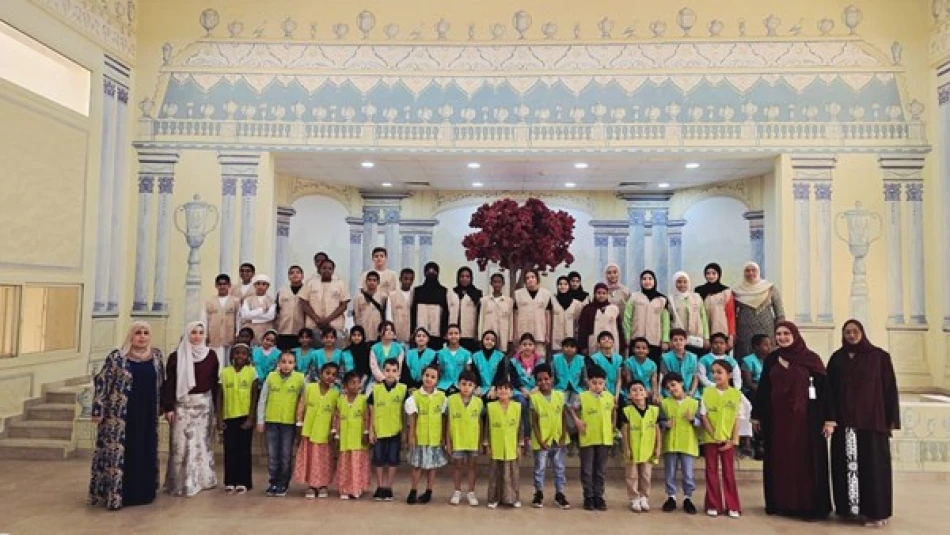
Sheikh Mohammed bin Khalid Al Nahyan's Quran Recitation Program Launches in Al Ain for 2025-2026
UAE's Al Ain Launches AI-Powered Reading Program to Build "Challenge-Ready Generation"
The Sheikh Mohammed bin Khalid Al Nahyan Reading Program has launched its 2025-2026 edition in Al Ain, marking a significant shift toward AI-integrated literacy education. Now in its 20th year, the program introduces artificial intelligence tools to digital reading for the first time, positioning the UAE as a regional leader in technology-enhanced education while addressing growing concerns about digital literacy in an AI-driven world.
Two Decades of Building Reading Culture
The program began in 2005 with a simple mission: make reading a cornerstone of Emirati youth development. Under the patronage of Dr. Sheikha Shama bint Mohammed bin Khalid Al Nahyan, it has evolved from basic literacy promotion to a comprehensive cultural initiative.
This year's theme, "A Reading Generation... A Generation Ready for Challenges," reflects broader UAE ambitions to build a knowledge-based economy. The timing aligns with the country's National Reading Strategy, which aims to position the Emirates as a regional hub for intellectual development.
AI Integration: Following Global Trends
The program's AI integration puts the UAE alongside countries like Singapore and South Korea, which have pioneered technology-enhanced learning. But there's a practical reason for this shift.
Traditional reading programs face declining engagement as young people gravitate toward digital platforms. By incorporating AI tools, the UAE is betting that technology can enhance rather than replace traditional literacy.
Three-Tier Approach
The program operates through three initiatives targeting different age groups:
"Knowledge Buds" focuses on early childhood development, "Knowledge Crown" targets middle-grade students, and "Emirates of Knowledge" serves older participants. Each tier adapts AI tools to age-appropriate learning methods.
What This Means for Regional Education
The UAE's move signals a broader shift in Gulf education policy. While Saudi Arabia focuses on NEOM's futuristic education models and Qatar emphasizes research universities, the UAE is positioning itself as the region's digital literacy leader.
This matters for several reasons. First, it addresses the "digital divide" between traditional Arabic literature and modern technology skills. Second, it creates a template other Arab nations might follow.
Economic Implications
Knowledge-based economies require literate, tech-savvy workforces. The UAE already hosts major tech companies' regional headquarters. A generation comfortable with both Arabic literature and AI tools could strengthen this position.
The program also supports the UAE's Vision 2071, which aims to make the country the world's best by its centennial. Education initiatives like this one lay groundwork for that ambitious goal.
Challenges and Opportunities
Integrating AI into traditional reading programs isn't without risks. Critics worry that technology might replace deep reading with surface-level engagement. There's also the question of maintaining Arabic language authenticity while embracing digital tools.
But the UAE's approach seems measured. The program combines AI tools with traditional activities like storytelling, art workshops, and family engagement sessions. This hybrid model could address both technological advancement and cultural preservation.
Regional Competition
Other Gulf states are watching closely. Saudi Arabia's Vision 2030 includes similar education goals, while Qatar's National Vision 2030 emphasizes knowledge development. The UAE's AI integration could spark regional competition for educational innovation leadership.
Looking Ahead
The program's success will likely influence UAE education policy for years to come. If AI-enhanced reading produces measurable improvements in literacy and critical thinking, expect similar initiatives across other subjects.
More broadly, this represents the UAE's ongoing effort to balance tradition with innovation. By using cutting-edge technology to promote Arabic reading culture, the program embodies the country's approach to modernization without cultural abandonment.
The real test will be whether students engage meaningfully with both the technology and the literature. Early indicators from the launch event, including interactive video sessions and creative workshops, suggest promising initial reception.
Most Viewed News

 Layla Al Mansoori
Layla Al Mansoori






